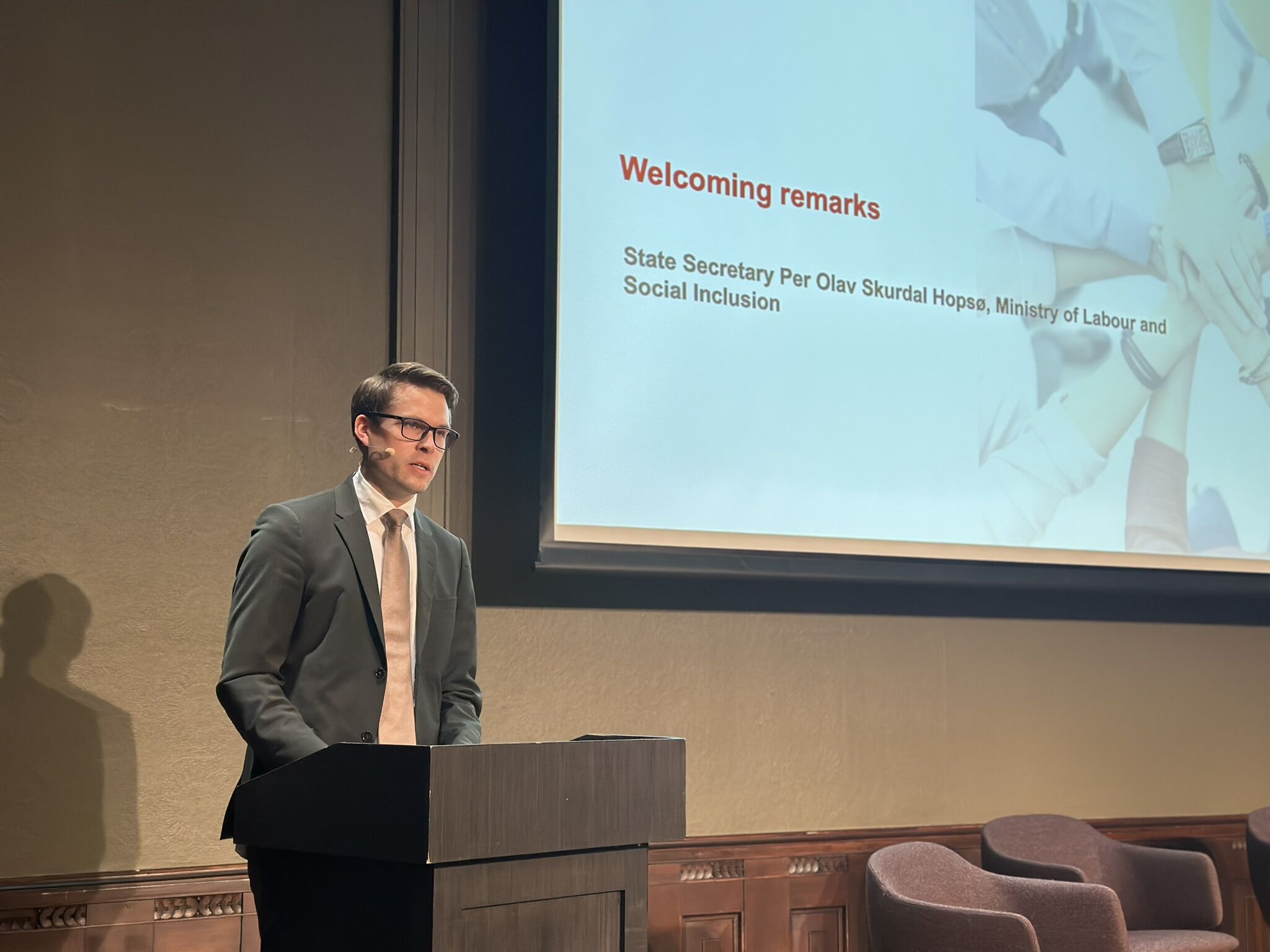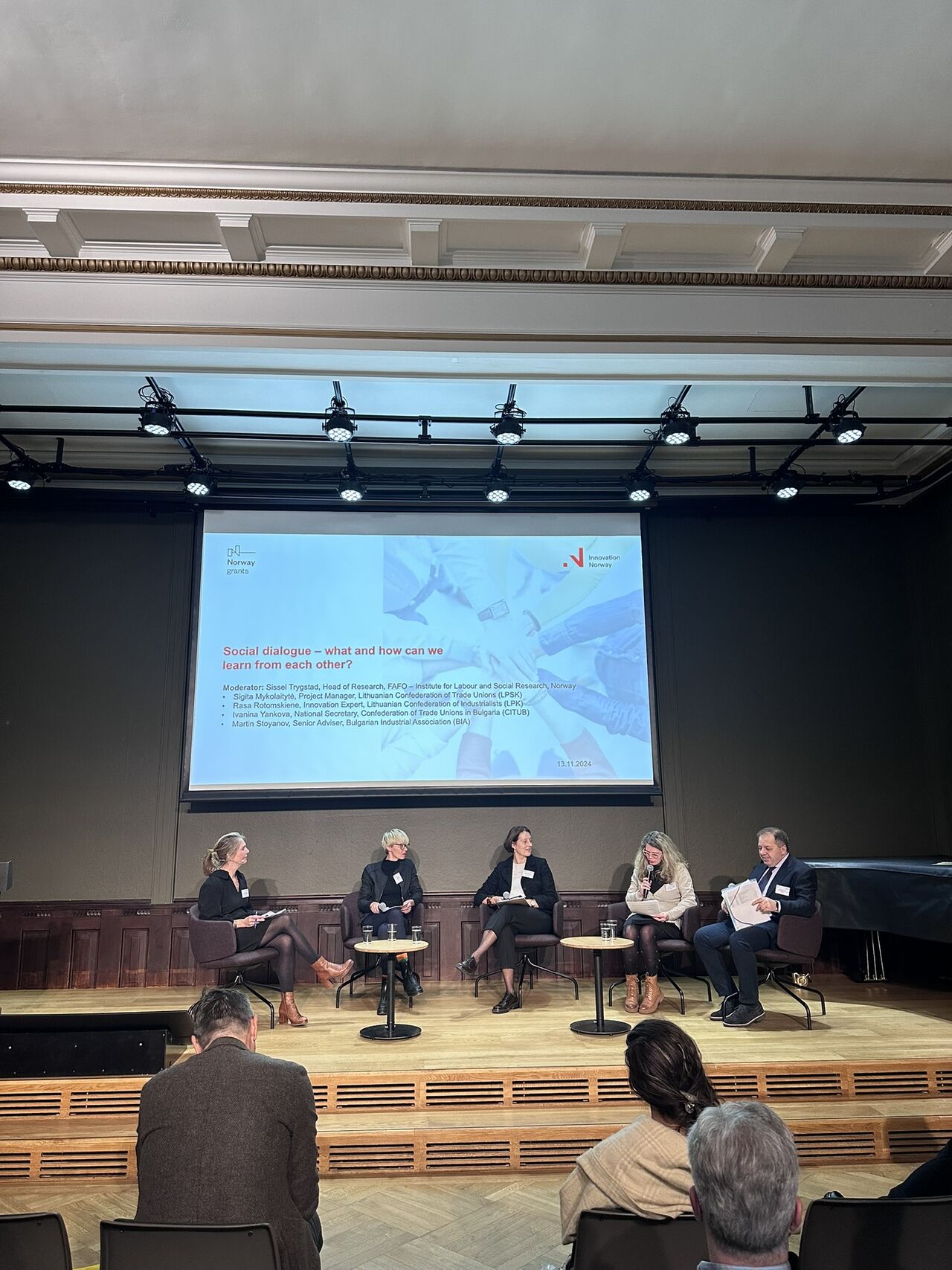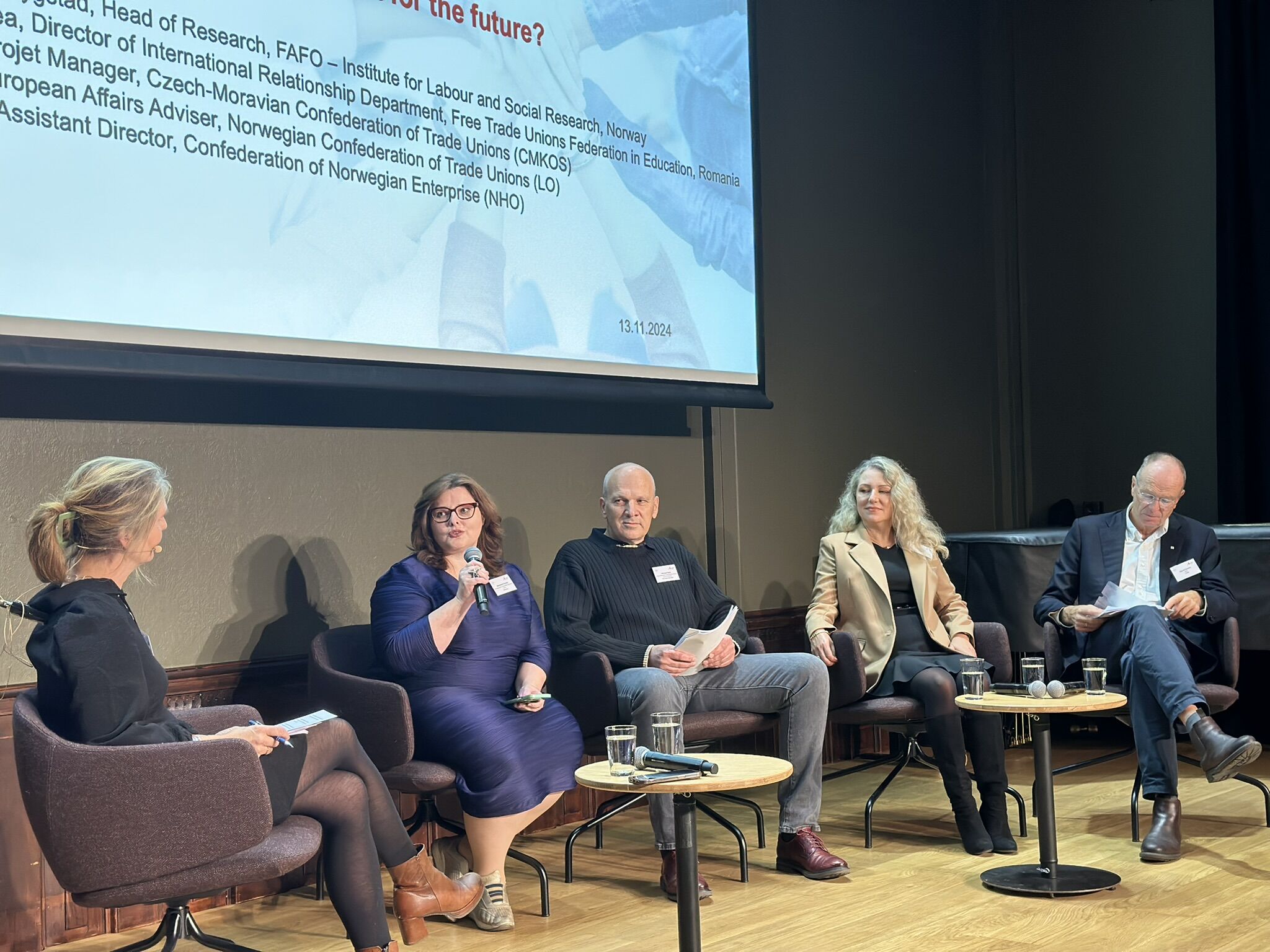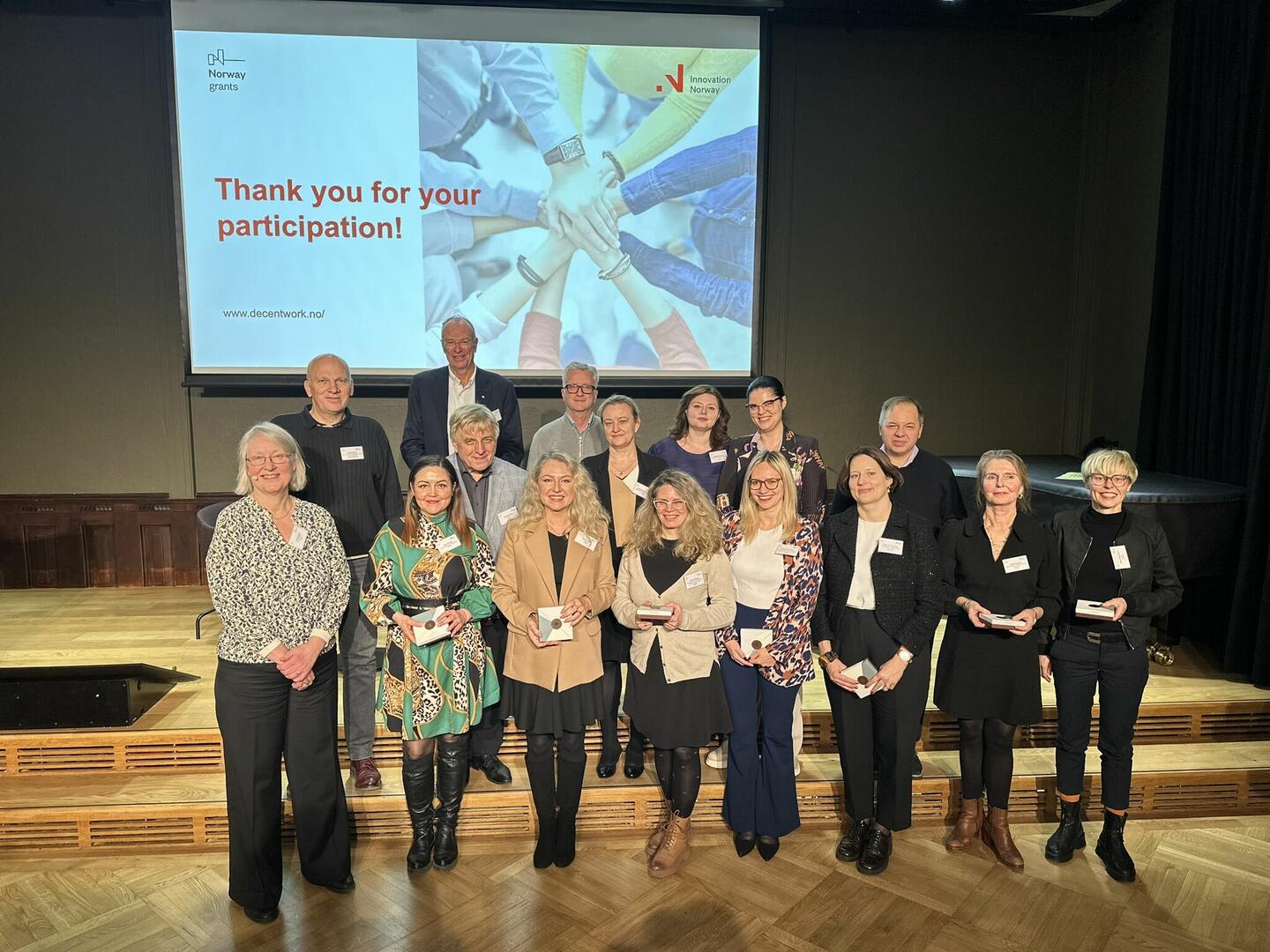Hosted by Innovation Norway, this event marked the end of a successful seven-year programme aimed at enhancing social dialogue and improving working conditions in 12 European countries.
Over the years, the programme has built the capacity of social partners, fostered trust, and created forums for employers and employees to collaborate. Inspired by the Nordic model, it has promoted decent work and facilitated access to employment. The 96 projects have been supported by a total of 10 million euro and have influenced national policies and law, facilitated collective agreements and improved working conditions for employees.

Per Olav Skurdal Hopsø, State Secretary at the Norwegian Ministry of Labour and Social Inclusion. (Photo: Natalia Muscher, Innovation Norway)
Opening the event, Per Olav Skurdal Hopsø, State Secretary at the Norwegian Ministry of Labour and Social Inclusion said: “Social dialogue is a key instrument for economic and social cohesion and good governance. This programme has therefore been a valuable contribution to the overall objectives of the EEA and Norway Grants.“
Strengthening tripartite cooperation
The overall aim of the programme area is to strengthen the tripartite cooperation between employer organisations, trade unions and public authorities, and to promote decent work. The fund supports access to employment and participation in the labour market, as well as work-life balance, employee adaptability and life-long learning and public sector social dialogue, among others.
The EU aims to strengthen social dialogue, both at the national and European level, but this ambition is not fully reflected in the EU funding possibilities for social partners. Through this programme the Norway Grants contribute to closing this funding gap.
Fostering trust through dialogue
Trine Berggren, Programme Director for the EEA and Norway Grants in the Donor Programme Partner Innovation Norway could report that building trust is important for a well-functioning social dialogue. Trust is not easy to measure, but still each project was asked to report on their perceived feeling of trust between the cooperating social partners. Their level of trust was reported to had risen from 3.51 on a seven-point scale at the start of the project to 5.12 at project end.
This was demonstrated in a session with partners from social dialogue projects. Sigita Mykolaitytė from the Lithuanian Trade Union Confederation (LPSK) and Rasa Rotomskiene from the Lithuanian Confederation of Industrialists (LPK) have during the project signed a Basic Agreement between employers and employees, inspired by the Norwegian Basic Agreement.

Sissel Trygstad, FAFO - Institute for Labour and Social Research, Sigita Mykolaitytė Project Manager, Lithuanian Trade Union Confederation, Rasa Rotomskiene, Innovation Expert. Lithuanian Confederation of Industrialists, Ivanina Yankova, National Secretary, Confederation of Trade Unions in Bulgaria and Martin Stoyanov, Senior Adviser, Bulgarian Industrial Association. (Photo: Natalia Muscher, Innovation Norway)
“Signing the agreement between LPSK and LPK was a game changing milestone. It was a new start for trust, a ground for building social dialogue in the future. In the past we never sat down to talk and look for what we can agree on,” said Mykolaitytė.
Rotomskiene agreed. “Building trust is important because we are challenged by long-held attitudes, stemming from our history. Now I think we are on the right path and are making progress.”
Knowledge exchange across borders
“Study visits to Norwegian partners funded by the Norway Grants to exchange knowledge on how to build trust between partners has been very useful,” said Rotomskiene. Cooperation is at the heart of the programme, both between social partners and the government in each country. A key aspect of the programme has been bilateral cooperation with Norway, with 67 projects involving various Norwegian partners to exchange know-how and best practices.

Sissel Trygstad, Head of Research, FAFO – Institute for Labour and Social Research, Norway, Alexandra Cornea, Director of International Relationship Department, Free Trade Unions Federation in Education, Romania, Michael Tauš, Project Manager, Czech-Moravian Confederation of Trade Unions (CMKOS), Yanina Unnli, European Affairs Adviser, Norwegian Confederation of Trade Unions (LO), Henrik Munthe, Assistant Director, Confederation of Norwegian Enterprise (NHO). (Photo: Natalia Muscher, Innovation Norway)
The Czech-Morovian Confederation of Trade Union (CMKOS) has in close cooperation with the Norwegian Confederation of Trade Unions (LO), explored what digitalization could mean for social dialogue and to enhance the digital capacity of trade unions.
The project “Digital Trade Unionism – Possibilities and Opportunities” focused on how we think of technology. Looking to experts and partners abroad, it successfully mapped the current state of digital social dialogue and strengthened it through transparent potential digital setups for trade unions in the Czech Republic.
Decent work for all
The decent work component of the programme was exemplified by the Romanian ID-card project for construction workers. Supported by the Norway Grants, this initiative explored the introduction of ID cards for construction workers in Romania, as a tool for detecting and preventing undeclared work, identify employees on construction sites, facilitate registration of training and work experience, and provide information related to workers' income and contributions to the public budget.
The Social Dialogue and Decent Work Programme was after 2022 expanded to respond to the Russian invasion of Ukraine and the following influx of refugees. At the closing event, two Polish trade unions presented their work on projects directed towards decent work for Ukrainian refugees in Poland. From the Czech Republic, the ROSE project aims to enhance self-employment opportunities for refugees and marginalized groups, closely aligned with the objectives of the Social Dialogue and Decent Work Programme. Through tailored training and capacity building programs, it addresses specific labour market needs and supports Ukrainian refugees to start their own businesses.
Read more:
- From Challenges to Change: Romania’s ID Card Project for Construction Workers | EEA and Norway Grants
- The Road to Digitalization: CMKOS Paving the Way for Social Dialogue in a Digital World | EEA and Norway Grants
- The ROSE Project: On the path to self-employment.
